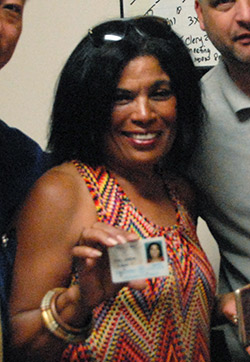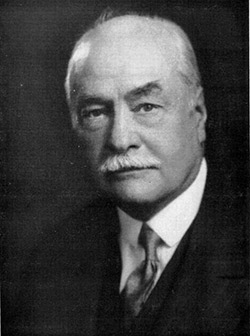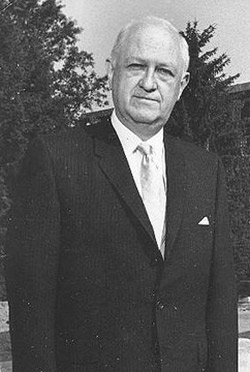Lost & Found: A diploma, a wallet and a dissertation refuse to stay buried in TC's past
In the following three tales, TC’s history more or less repeats itself:
1. Annals of Diploma-cy
A cherished heirloom makes its way home
In the various New York City apartments in which Henrietta Katzev grew up, one constant was the 1Bachelor of Science diploma that her mother, Blanche Katzev (nee Schwamm) received from Teachers College in 1938.
“Whenever we moved or painted, she put it on the wall so she could see it,” Henrietta Katzev recalls. “TC and Columbia were a very defining area for my mother. All her family went to NYU, including her twin sister, so coming to Columbia was really breaking out on her own. And the education she got there really shaped her life. She was always involved in the cultural life of the city. Right up until she died, she was always reading the Times and The New Yorker, listening to WQXR, going to the opera. She was never bored – her mind was more active than most people’s half her age.”
But there was another reason, equally important, why Blanche cherished the diploma: It was signed by Nicholas Murray Butler, who reigned as Columbia’s President for 40 years after presiding over TC from 1889-1891. Butler was the unsuccessful Republican nominee for Vice President in 1912 and received the Nobel Prize in 1931 for his service as President of the Carnegie Endowment for International Peace.
“My mother always told me her diploma was signed by a very important dean who won the Nobel Prize,” Henrietta Katzev recalls. She was as proud of her connection with Nicholas Murray Butler as she was of having gone to TC.”
When Blanche died in 2000, at the age of 86, her daughter faced a tough decision: what to do with the diploma? “There was no one in the family who wanted it, and I certainly wasn’t going to discard it. And then I had the spark: I’ll give it to TC.”
Katzev called the Columbia switchboard and, to her surprise, was swiftly relayed, with only a few stops, to Mary Amoon-Hickey, Associate Director for Planned Giving, who is an avowed TC history buff, and thence to John Allegrante, the College’s Associate Vice President for International Affairs, another history aficionado, who said he would be delighted to take the diploma and hang it in his office.
“People were so incredibly helpful,” Katzev says.
Some weeks later, she came to TC for a viewing.
“My jaw just dropped,” Katzev says. “For years, the diploma had been in a rinky-dink wooden frame, covered in plastic, with a little water damage in the corner. And now there it was, perfectly restored and in a beautiful new frame.
“Donating it was an honor,” Katzev adds. “My mother would have been 100 this summer. I miss her so much, and this gives me such a warm feeling. I can’t think of anything nicer I could do for her.”
2. Encore with Wallet
Opera singer and voice teacher Jennifer Eyges (M.A.’83) reunites with a precious possession she didn’t know she’d lost
Former music education student Jennifer Eyges has lots of vivid memories of Teachers College, including studying theory with Robert Pace and piano with Hadassah Gallup Sahr and performing her graduation recital in St. Paul’s Chapel on the Columbia campus.
“TC opened a lot of doors for me,” says Eyges, who has since taught at the Brooklyn Conservatory of Music, served as Music Director of the Northern Westchester Center for the Arts, performed at Carnegie Recital Hall and throughout Europe, Canada and the West Indies and recorded with the Russian-born composer Margarita Zelenaia.
One thing Eyges does not remember, though, is losing her wallet – so she was a bit surprised when she got a phone call this past summer from Hoi-Ming So, Associate Director of Operations in TC’s Office of Public Safety, informing her that a wallet belonging to her had turned up behind a row of lockers a renovation of a basement corridor in Zankel Hall.
In it were Eyges’ 1981 TC student and Columbia staff ID cards; her driver’s license (which then cost $3); her social security card; some medical forms; and a picture of her husband. There was no money, either because the wallet may have been stolen or else because – Eyges says ruefully – there wasn’t any in it to begin with.
“I was a student, so I wasn’t exactly rich,” she says.
Eyges made the trip down from Westchester to reclaim her wallet and was accompanied by So on a tour of TC “back through time” that concluded with her getting a new TC ID card.
“It really brought me a few moments of fun and fame, and Mr. So was very gracious,” says Eyges, who continues to teach privately. “I feel like I’ve reconnected with the College as well.”
3. Finding TC in the Unlikeliest Places
A 1932 TC dissertation on college worship turns up in a boarded-up West Viriginia general store
Last spring, Tom Rock, TC’s Associate Dean for Enrollment Services, received a gift from a friend: a plain, navy blue hardcover copy of The Improvement of College Worship, the Teachers College Ph.D. thesis of one Paul N. Elbin, published in 1932 as part of a TC series called “Contributions to Education.” Rock’s friend, Alexis McHenry McLaughlin, a classmate from his undergraduate days at the University of Dayton in Ohio and now a public school teacher, had found the dissertation on a trip to West Virgina with her father.
“The dissertation is from Fluharty’s General Store in what was formerly known as Piney,” McLaughlin explained in an email. “Dad grew up in Piney when there was a town. It was an oil-and-gas boom town through the beginning of the 1900s. After that, the wells slowly dried up and the town with it. It’s in the ‘Hollers’ of West Virginia – the Appalachians. The nearest real town is Pine Grove and the closest big town is New Martinsville. There were 41 schools in that rural county at one time and teachers had to learn somewhere, so maybe one or more graduated from TC?
“Henry Fluharty was the man who opened the store way back perhaps before 1900. His grandson, Joe Haught, owns property there. Joe’s late wife was the collector of interesting items, which I believe she sold from the former general store... When she died, Joe didn't do much with what was left. As I looked at the books and glassware, he told me to take whatever I wanted. The book was in a covered box – lucky thing, the uncovered ones were badly damaged. The late Mrs. Haught may have picked it up at a library or estate sale somewhere.”
But the story doesn’t end there. When the dissertation was shown to Lisa Miller, Professor of Psychology and Education and creator of TC’s master’s degree program in spirituality and psychology, she instantly identified the author as the same Paul Elbin who served as President from 1935 to 1970 of West Liberty University, West Virginia's oldest institution of higher education, where a library was dedicated to him the year he retired.
“Elbin wrote The Bible Bee [The Bible Question Bee: 1,000 Questions and Answers, 300 Spelling Words] as a way of learning about religion- finding a way to put spirituality into education,” Miller says.
His dissertation, which he wrote under the guidance of Professor Adelaide Teague Case, begins by noting that “the leaders of college worship…especially in state and non-sectarian schools, do not feel free to follow the practices of any one denomination.” and that “the crowds of young people who flock to college chapels, some by compulsion… present to the person delegated to lead their worship problems which are not easily solved.” Observing that “in some colleges the chapel service is in the rut that appears to be its grave,” Elbin devotes his study to asking “what objectives may college worship seek?” at one point concluding that “a mean between an unnatural sanctimoniousness and the undignified nature of some religious “pep meetings” will likely be acceptable to most student groups.”
For Miller, Elbin is a figure worthy of celebration – a man whose career prefigured her focus, and the College’s, on spirituality.
“It’s so great to see that we were doing things like this so long ago,” she says.
The find also spotlights the Contributions to Education series, through which TC published the research of some 974 doctoral graduates from the years 1905 to 1951. The series “impressively details [TC’s] intellectual history…but more significantly, [traces] the development of the educational professions at large,” wrote Robert J. Schaefer, who served as Dean of Teachers College during the 1960s and 70s. “Considered in its entirety, the series presents a microcosm of professional scholarship and educational thought from the turn of the century through the early 1950s.”
Perhaps Paul Elbin would have been pained to know that his dissertation turned up, quite literally, in a dustbin of history. On the other hand, that it traveled to such an odd location suggests that someone out there in the real world was reading it. So take heart, ye writers of doctoral theses: you never know what’s in store. – Joe Levine
Published Monday, Oct. 20, 2014


